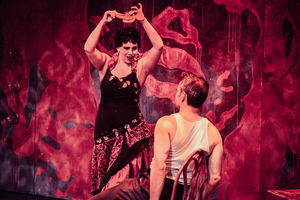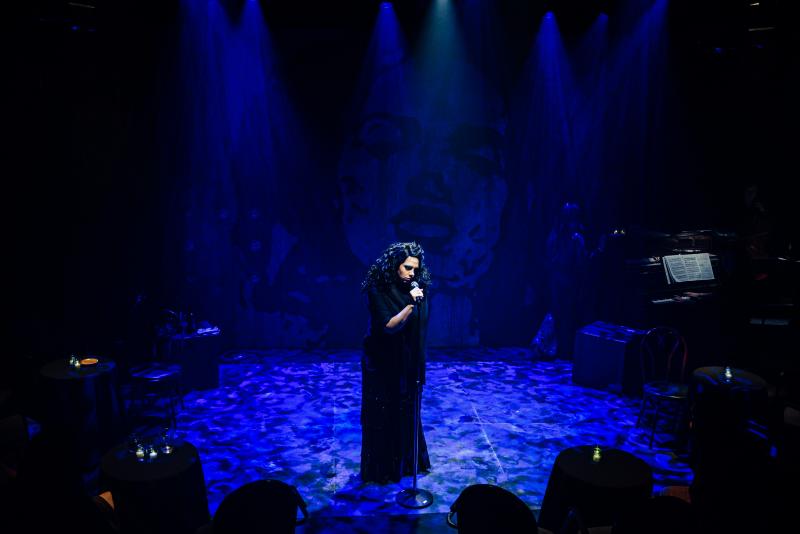Review: LE CABARET DE CARMEN at IN Series

Georges Bizet's Carmen is one of the best-known operas in the world, and its songs "Habanera" and "Toreador Song" are timeless pieces that are instantly recognizable to opera fans and novices alike. It's an old tale of love, seduction, loss, and jealousy, and one that - while shocking when it first premiered - has served as a foundation for countless works since.
The tragic opera follows a young, naive soldier, Don José, who is seduced by Carmen, abandoning his fiancée, Micaela, and his military duties for the flirtatious woman. But when she in turn abandons him for the glamorous torero (bullfighter), Escamillo, Don José's jealousy leads him on a violent downward spiral.
IN Series' production, Le Cabaret de Carmen, puts a new twist on an old tale, setting the story in a seedy nightclub, and arranging the blackbox theatre to feel more like a cabaret than an opera hall. Although most of the audience is still in regular seating, a small number are placed at cabaret tables, where the actors are able to interact with them (be warned, if you take these seats, you're in the splash zone, both literally and metaphorically). This interpretation of Carmen is grittier, darker. It's not dressed up for respectable society, but instead embraces its tragic themes. In doing so, it's also able to strip down a lot of the trappings of a more elaborate production, and instead give a deeply sympathetic, heartbreaking look into the titular character. Carmen may be sensuous in her figure-flattering dresses as she goes about her sultry routine, but that facade easily falls away after her first number, and the audience is left in a grimy nightclub with a woman who is abused, handed around like a possession, and constantly fending off attacks from forceful would-be suitors. This Carmen isn't a seductress, out to ruin men for her own pleasure - she's a woman in desperate circumstances, trying to maintain her autonomy and dignity in a world where everyone else has more say in her life than she does.
Despite the dark imagery and themes, the IN Series production is also achingly beautiful. This is partly due to the fantastic lighting (courtesy of Marianne Meadows) striking set piece (Jonathan Dahm Robertson's stunning work), and the beautiful and telling costumes (designed by Donna Breslin - Carmen's dresses and wigs alone are masterful), but is also a credit to this fabulous cast. Brian Arreola is the lovestruck, impulsive Don José, playing the character with a sincerity that shines even as he spirals from shy naive soldier to a desperately violent man. His chief rival for Carmen's affection is Alex Alburqueque's Escamillo, played with such fun bombast that the entire mood lightens whenever he takes the stage. Alburqueque's character also shoulders a number of pointed references that fit today's climate as well as that of the show; between those references and his (offstage) fate, he's the biggest dichotomy - a tragic figure who never presents as one. Don José's other rivals are embodied by Kyle Dunn, though Dunn's main role is the host of Chez Pastia; in this role, Dunn stalks the stage with dark looks and an angry cloud of energy - even when he's not the focus, Dunn's stage presence is undeniable, and his ever-present menace keeps the show's dark tone in the audience's mind even in the lighter moments. As Madame Pastia, Lydia Gladstone relishes her character's unpleasantness - her character is the one that threatens and abuses Carmen, that pushes Don José into his first encounters with the singer, and that mocks Don José's would-be fiancée for her innocence. And yet, the character is so delicious in Gladstone's hands, it's enjoyable to despise her. Poor Micaela, Don José's intended, is played sweetly by Kelly Curtin; the duet she shares with Carmen toward the end of the production is one of the most heartbreaking of the show, but also one of the most beautiful moments.

As the titular Carmen, Cara Schaefer brings a stunning vulnerability to the infamous seductress. Schaefer's Carmen is raw and haunting, an abused woman who is barely keeping herself afloat as her world closes in. Her facial expressions telegraph her grief to the audience even as she sings her seductive songs, but it is her steely resolve when she faces down Don José and professes that she doesn't love him that stands out above anything else. This is a woman who has nothing in the world, nothing to lose, except for herself, and she refuses to let anyone fully take that from her, even in her final moments. Schaefer's portrayal is a fresh, tragic take on the role, one that feels more fitting not just for this production, but for how we should consider the famous character in our modern lens.
It's impossible to consider the cast of this production without also looking at the incredibly talented orchestra. Music Director Emily Baltzer leads the small band of musicians on piano. She is accompanied by the musical arranger and cellist, Maxfield Wollam-Fisher, and Heyni Solera on the bandoneon (an accordion-like instrument). The three not only carry Bizet's wonderful music, but also have a bit of fun, joining in some of the nightclub scenes with Escamillo.

Artistic Director Timothy Nelson's staging (aided by Stage Manager Joe Gladstone and Movement Director Juan Carlos Rincones) is one of the many strengths of this production. As the audience walks in, members of the orchestra and cast perform tango on the stage, a slow, seductive dance that helps set the tone before the show starts. Madame Pastia is bustling around the cabaret tables, as though the audience members are actual patrons in her nightclub. Dry ice fills the room with a haze, and Dunn, as the Host, sits with a cigarette, watching the audience filter in with an unamused air. Well before the show has even begun, the audience has a clear sense of the world they are entering, so by (figurative) curtain, they are already immersed. Attention is always on the action of the show, but even the smallest background details are attended to as well; when Carmen is in her dressing room after her last performance, we can see the Host and Madame Pastia clearing the nightclub for the evening; when Carmen and Escamillo are performing, the audience watches the other characters react to (or pointedly ignore) their numbers. The attention to these details is impeccable, and provides for a much more engaging experience. The production itself is clear and tight, never failing in its pace or its emotional impact. Even the small character decisions - including Carmen fashioning a set of castanets mid-performance or Escamillo's bull horns - are all smart, detailed additions to the show.
IN Series' Le Cabaret de Carmen is a haunting, beautiful spin on the popular tragedy. It's a unique and thoughtful retelling, with a wonderful cast and production team, and is entrancing from its languid opening to its dramatic finale.
In Series' Le Cabaret de Carmen plays at the Source Theatre through January 19, and at the Baltimore Theatre Project February 21-23. Performance run time is approximately ninety minutes, with no intermission. Le Cabaret de Carmen is mostly performed in French with projected subtitles in English, with some English dialogue interludes. Information on tickets, special performances, tango lessons, accessibility, and more can be found on the IN Series website.
Photos courtesy of RX Loft.
Reader Reviews

Videos
